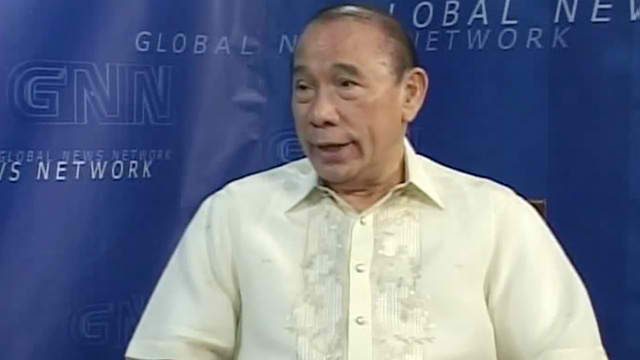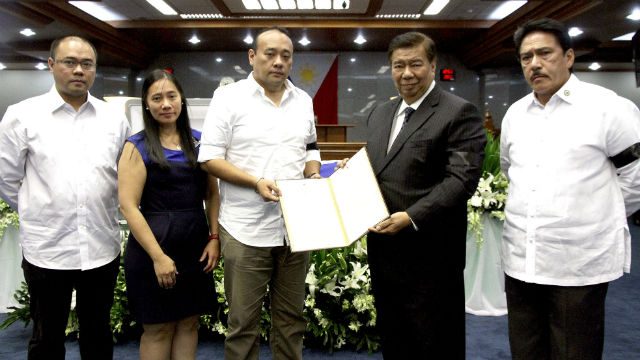SUMMARY
This is AI generated summarization, which may have errors. For context, always refer to the full article.

MANILA, Philippines – Former and incumbent senators on Wednesday, November 4, honored the memory of the late senator and trade union leader Ernesto “Boy” Herrera, calling him the modern-day Apolinario Mabini who overcame physical challenges to become an outstanding public servant.
A necrological service in honor of the senator was held at the Senate Session Hall, where his former colleagues took turns recalling his noteworthy contributions to the country.
Herrera, widely recognized as a “titan of the labor movement” died of cardiac arrest on October 29 at the age of 73.
Two of his former Senate colleagues hailed him as the “20th century Apolinario Mabini,” who became an iconic national figure despite suffering from polio as a child.
“I only have superlatives to describe this honorable man from the Visayas who dedicated his life to a greater cause. He was the 20th century Apolinario Mabini who courageously overcame polio to become one of the country’s outstanding public servants,” said Senate President Franklin Drilon.
Former senator Jose Lina Jr made the same comparison, saying that Herrera “used his intellectual prowess to serve the interest of the country despite his physical infirmity.”
According to Lina, Herrera’s reputation as a champion for labor, employment, fiscal, education, anti-drug, and law and order policies was not tarnished by allegations of malfeasance in public service.
Herrera, a former Bohol representative, was a two-term senator who won in the 1987 and 1992 elections. His landmark reforms in vocational education and training resulted to the creation of the Technical Education and Skills Development Authority.
He was a member of the Agrava Fact-Finding Board that investigated the 1983 assassination of former senator Benigno “Ninoy” Aquino Jr.
A former general secretary and president of the Trade Union Congress of the Philippines, Herrera was also a staunch advocate of the promotion and protection of Filipino workers’ rights.
‘Working class rep’
In an interview with Rappler, former senator Heherson Alvarez said Herrera was an exceptional leader “because he did not only represent a group – the working class – but he was part of that class.”
“All of senators here represented the people sometimes, and we were never really a part of the group we stood for. Only Boy Herrera stood for [the] laborers – he was a laborer and he stood there and made his distinctive contributions for an exceptional man,” Alvarez said.
The eulogy of former Senate President Edgardo Angara was delivered by his son, Senator Juan Edgardo “Sonny” Angara.
“Boy Herrera’s drive and enthusiasm was undiminished by his physical handicap since he contracted polio in his youth. He achieved far more than his able-bodied counterparts and he lived a life of singular purpose. He remains an inspiration to us all,” Angara said.
Herrera’s family and friends, including his wife, Lourdes, and their children, Maria Luzil, June Francis, Ernesto II, and Ernesto III, attended the necrological service.
From the Senate, his remains were transferred to Cebu, his home province.
A ‘true democrat’

During the program, the Herrera family was presented a copy of Senate Resolution No. 104, which lauds Herrera for being a “great leader and a public servant who led a life dedicated to promoting the welfare and protecting the rights of the working class.”
On Tuesday, November 3, the Senate adopted SR No 104 in honor of Herrera and SR No 103 as a tribute to former senator Joker Arroyo, who passed away on October 5.
“[Herrera’s] work, as a trade union leader and as a legislator, reflected his boundless love for our country and our people,” said Drilon.
“In many labor disputes, we found ourselves sitting across the bargaining table. I have nothing but admiration for this principled man. He defended the rights of the working class, not for his personal gain – and I underscore that, not for his personal gain – but for the improvement of the workers’ general well-being. He was cut above the rest, a legend in his own right,” he added.
Angara recalled that Herrera was the only Filipino member of the executive board of the International Confederation of Free Trade and Union from 1988 to 1992, and the first Asian recipient of the George Meany international Human Rights Awards in 1985.
“I remember Boy speaking from rally to rally, in province after province. He was on his crutches, he was a dramatic figure with a booming voice and a quaint accent when speaking in English. He would become one of my very closest associates in the Senate,” Angara said.
He called Herrera a “true democrat” who “shunned populist and hard-left rhetoric.”
In her eulogy, Senator Loren Legarda, a former journalist, recognized Herrera’s efforts to expose shabu factories in Metro Manila at the time when it was not yet known in mainstream media.
“He feared not the consequences of his exposés but rather, the repercussion of the maleficent substance to the nation. Not many know that he built the first drug rehab center in Nasugbu, Batangas way back in the 1990s through Mayor Charito Apacible, a dear friend long before I became senator,” Legarda said.
Support in the Senate
Former senators Alvarez and Ernesto Maceda thanked Herrera for his support for them while they were in the Senate.
Alvarez, one of the initiators of the impeachment complaint against ousted president and now Manila mayor Joseph “Erap” Estrada, said “nobody” was prepared to support him then because Estrada was a popular president among the masses.
“So takot lahat ng congressman (So the congressmen were afraid)! But Boy Herrera signed the bill of particulars with me and we were the ones who impeached that erring president. He’s a very courageous man,” recalled Alvarez.
Maceda considered Herrera as a “very quiet but effective legislator” who was also “a very quiet supporter of everybody’s favorite bill [in the Senate].”
“I thank you, Boy, for the support you extended to my bills in the same way I’ve extended my support to your bills. I thank you for helping install me as Senate president in 1996. I thank you for being a friend of the masses and of everybody,” Maceda said.
‘Good father, loving husband, doting lolo’

At the end of the program, Herrera’s son, Ernesto II, thanked the senators on behalf of the family.
“Our dad was a labor leader, senator, writer, teacher. He was many things to many people but beyond that, to us, he was a good father first and foremost, a loving husband, a doting lolo (grandfather), a very supportive uncle. He was a pillar of our entire family,” he said.
According to Ernesto II, his father regarded his 12 years in the Senate as “very special” and “some of the best of his life.”
The son also used the occasion to defend his father against claims that Republic Act No 6715, which Herrera authored, was supposedly responsible for labor contractualization in the country.
Ernesto II said Herrera authored a bill that “provided for the mandatory regularization of employees who have rendered 6 months of continuous service, a provision that was eventually included in the Revised Labor Code.”
“Unfortunately, department orders of DOLE (Department of Labor and Employment) allowed companies to circumvent this measure by using labor-only contracting agencies which imposed 5 month contracts. In fact, record shows my dad was very critical and fought against these department orders favoring labor-only contracting,” said Ernesto II.
“It is unfair to blame contractualization on my dad. It was a totally misguided opinion, twisted truth, and it’s downright unfair,” he added.
According to Ernesto II, his father’s track record proves that Herrera practiced what he preached.
“In all the 4 decades he was involved in politics as a legislator and as a workers’ advocate, he always worked to restore the innate dignity of the common Filipino worker,” Ernesto II said.
“If there’s anything my dad loved about being a senator, it was that opportunity to help make a difference, to make politics work for people and especially for the Filipino workers.” – Rappler.com
Add a comment
How does this make you feel?
There are no comments yet. Add your comment to start the conversation.